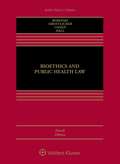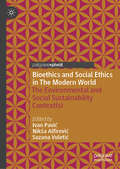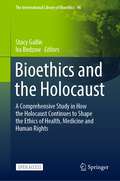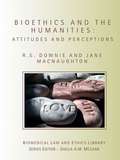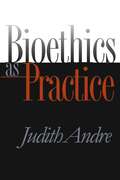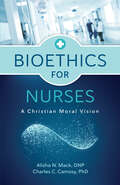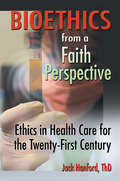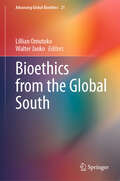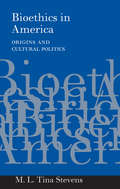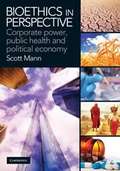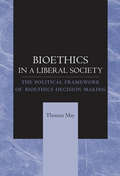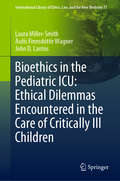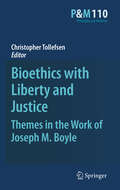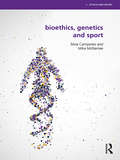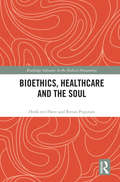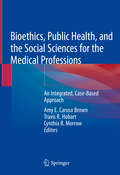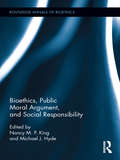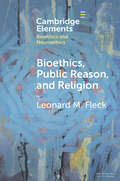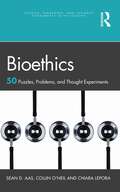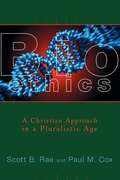- Table View
- List View
Bioethics and Public Health Law (Aspen Select)
by Mark A. Hall Mary Anne Bobinski David Orentlicher I. Glenn CohenFinancial and ethical issues are integrated into this concise and engaging treatment of Bioethics and Public Health Law. The complex relationship between patients, providers, the state, and public health institutions are explored through high-interest cases, informative notes, and compelling problems. The updated Fourth Edition includes recent cases and developments in biotechnology, including stem cell research and gene patents, and updates to HIPPA coverage, DNA research, and bio-banks. Discussions of confidentiality and informed consent include new legislative and judicial responses to posthumous reproduction and the challenges arising from international reproductive tourism.
Bioethics and Social Ethics in The Modern World: The Environmental and Social Sustainability Context(s)
by Nikša Alfirević Ivan Pavić Suzana VuletićThis book explores the philosophical analysis of attitudes and values and sustainable behaviors in fields such as healthcare, social sciences, economics in the context of environmental studies. It firstly investigates the fundamental concept of bioethics with relevant case studies related to the issues of human life and preservation of dignity. The authors then move on to discuss the application of (bio)ethical principles in contemporary society and within the market economy. The last part of the book brings together a variety of perspectives on the general philosophical and ethical foundations of sustainable behavior based on the idea of human dignity. This book offers a guide to understanding responsible sustainability practices in various fields, while considering the social benefits and economic effectiveness of sustainable behaviors.
Bioethics and the Future of Stem Cell Research
by Insoo HyunDespite years of heated social controversy over the use of human embryos in embryonic stem cell research, the caravan of stem cell science continues to proceed at an unrelenting pace all around the world. Bioethics and the Future of Stem Cell Research urges readers to look beyond the embryo debate to a much wider array of ethical issues in basic stem cell science and clinical translational research, including research involving adult and induced pluripotent stem cells. Insoo Hyun offers valuable insights into complex ethical issues ranging from pre-clinical animal studies to clinical trials and stem cell tourism, all presented through a unique blend of philosophy, literature, and the history of science, as well as with Dr. Hyun's extensive practical experiences in international stem cell policy formation. This thoughtful book is an indispensible resource for anyone interested in the science of stem cells and the practical and philosophical elements of research ethics.
Bioethics and the Holocaust: A Comprehensive Study in How the Holocaust Continues to Shape the Ethics of Health, Medicine and Human Rights (The International Library of Bioethics #96)
by Ira Bedzow Stacy GallinThis open access book offers a framework for understanding how the Holocaust has shaped and continues to shape medical ethics, health policy, and questions related to human rights around the world. The field of bioethics continues to face questions of social and medical controversy that have their roots in the lessons of the Holocaust, such as debates over beginning-of-life and medical genetics, end-of-life matters such as medical aid in dying, the development of ethical codes and regulations to guide human subject research, and human rights abuses in vulnerable populations. As the only example of medically sanctioned genocide in history, and one that used medicine and science to fundamentally undermine human dignity and the moral foundation of society, the Holocaust provides an invaluable framework for exploring current issues in bioethics and society today. This book, therefore, is of great value to all current and future ethicists, medical practitioners and policymakers – as well as laypeople.
Bioethics and the Humanities: Attitudes and Perceptions (Biomedical Law and Ethics Library)
by Jane Macnaughton Robin DownieCritiquing many areas of medical practice and research whilst making constructive suggestions about medical education, this book extends the scope of medical ethics beyond sole concern with regulation. Illustrating some humanistic ways of understanding patients, this volume explores the connections between medical ethics, healthcare and subjects, such as philosophy, literature, creative writing and medical history and how they can affect the attitudes of doctors towards patients and the perceptions of medicine, health and disease which have become part of contemporary culture. The authors examine a range of ideas in medical practice and research, including: the idea that patient status or the doctor/patient relationship can be understood via quantitative scales the illusion fostered by medical ethics that doctors, unlike those in other professions, are uniquely beneficent and indeed altruistic. An excellent text for undergraduate and postgraduate students of law, medical ethics and medical healthcare law, Bioethics and the Humanities shows the real ethical achievements, problems and half-truths of contemporary medicine.
Bioethics as Practice
by Judith Andre<P>Those who work in bioethics and the medical humanities come from many different backgrounds, such as health care, philosophy, law, the social sciences, and religious studies. The work they do also varies widely: consulting on ethical issues in patient care, working with legislatures, dealing with the media, teaching, speaking, writing and more. <P>Writing as a participant in this developing field, Judith Andre offers a model to unify its diversity. Using the term "bioethics" broadly, to include all the medical humanities, she articulates ideals for the field, identifies its temptations and moral pitfalls, and argues for the central importance of certain virtues. Perhaps the most original of these is the virtue of choosing projects well, which demands not only broadening the field's focus but also understanding the forces that have kept it too narrow. Andre offers an imaginative analysis of the special problems presented by interdisciplinary work and discusses the intellectual virtues necessary for its success. She calls attention to the kinds of professional communities that are necessary to support good work. <P>The book draws from interviews with many people in the field and from the findings of social scientists. It includes the author's personal reflections, several extended allegories, and philosophical analysis. <P>Those who work in bioethics and the medical humanities come from many different backgrounds: health care, philosophy, law, social sciences, religious studies, and more. The work they do also varies widely. Writing as a participant in this developing field, Judith Andre offers a model to unify its diversity. Using the term "bioethics" broadly, to include all the medical humanities, she articulates ideals for the field, identifies its temptations and moral pitfalls, and argues for the central importance of certain virtues.-->
Bioethics for Nurses: A Christian Moral Vision
by Charles C. Camosy Alisha N. MackRecovering the foundation of faith in a profession enduring the pressures of a rapidly changing health-care system.If you are one of the millions of Christian nurses or nursing students in the United States, you already know that there is no real way to separate your faith commitments from your professional vocation—nor would you want to. Especially amid the bedlam of the COVID-19 pandemic, faith has given countless nurses the strength to carry on and be there for their patients, one exhausting shift after another.Bioethics for Nurses, the first book of its kind, is for nurses and nurses in training who still believe in treating the whole person—not just their medical condition. It is for those committed to living out the love of Jesus Christ through the warm, relational care they provide for all hurting and vulnerable people—including those in underserved populations—each of whom has the dignity of a human being made in the image of God. It is also for those who rightly see themselves as crucial members of medical teams alongside doctors (and sometimes without doctors present at all), empowered to exercise professional judgment while protecting their consciences.With the combined wisdom of Alisha Mack, a professor of nursing with many years of clinical experience, and Charles Camosy, an award-winning bioethicist and theologian, Bioethics for Nurses advances a vision for a holistic Christian notion of health care with practical applications for everyday relevance on the job. Through a series of case studies in the second part of the book, Mack and Camosy explore the ethics of specific situations with far-reaching implications for nurses working in a range of fields. In the last part, the authors reflect on the future of nursing after COVID-19, making this an especially timely book for a pivotal moment in the history of the profession. Now, more than ever before, the wisdom of the ancient tradition of Christianity is needed to speak into the profound contemporary realities we are facing together as a culture.
Bioethics from a Faith Perspective: Ethics in Health Care for the Twenty-First Century
by Harold G Koenig Jack T HanfordDiscover the spiritual community's position on bioethics issues!Bioethics from a Faith Perspective: Ethics in Health Care for the Twenty-First Century offers a meaningful, rational, faith-oriented framework for deciding how to deal with important biomedical health care issues. Organ donation, managed care, the Human Genome Project, and medical technology that keeps people alive beyond their “natural” life span are some of the topics it illuminates through case analysis and resolution. Since almost all textbooks in bioethics omit the religious dimension of life (even though the field was inspired and stimulated by religious scholars at Princeton and Yale), this is an indispensable volume.While most people state their moral positions from the background of their religious traditions, many have not had the opportunity to study the relation between their faith perspectives and the difficult issues that arise in the pursuit of health care. This book shows the relevance, significance, and guidance that a faith perspective can offer for dealing with bioethical issues.This unique and thoughtful book: shows you how to distinguish and describe the relation between technical and ethical aspects of health-related issues provides you with a framework of moral principles, theories, values, and faith viewpoints teaches you the defining characteristics of a moral professional-client relationship related to faith helps you to discern when medical ethics and faith commitments are therapeutic and when they are not gives examples describing a moral problem, a faith perspective, and a justified position on that problemSince bioethics has been an amazing story of growth from the 1950s to the present day and is still expanding, there will be changes. Bioethics from a Faith Perspective stimulates that expansion by including the religious dimension. It is the perfect supplement to the existing literature on the subject.
Bioethics from the Global South (Advancing Global Bioethics #21)
by Lillian Omutoko Walter JaokoThis book tackles complex global issues like vaccination, climate change, environmental ethics, embryo adoption, and surrogate motherhood viewed from the perspective of the global south. The COVID-19 pandemic has emphasized the need for addressing bioethical issues on a global scale, beyond national and regional boundaries. Challenges highlighted in the book include cultural differences, multi-pluralism, insufficient funding, and limited opportunities for awareness and provision of education in global bioethics, particularly in low and middle-income countries. The book employs universal and global bioethics frameworks, referencing the Universal Declaration of Human Rights and the UNESCO Universal Declaration on Bioethics and Human Rights. These documents, along with other international agreements and national constitutions were used to advocate for human dignity, health, and fundamental freedoms. Contributions from authors in Kenya, Uganda, and Nigeria provide valuable perspectives, making this book a must-read for ethicists, bioethicists, medical students, and healthcare workers with an interest in global bioethics.
Bioethics in America: Origins and Cultural Politics
by M. L. StevensIn Bioethics in America, Tina Stevens challenges the view that the origins of the bioethics movement can be found in the 1960s, a decade mounting challenges to all variety of authority. Instead, Stevens sees bioethics as one more product of a "centuries-long cultural legacy of American ambivalence toward progress," and she finds its modern roots in the responsible science movement that emerged following detonation of the atomic bomb.Rather than challenging authority, she says, the bioethics movement was an aid to authority, in that it allowed medical doctors and researchers to proceed on course while bioethicists managed public fears about medicine's new technologies. That is, the public was reassured by bioethical oversight of biomedicine; in reality, however, bioethicists belonged to the same mainstream that produced the doctors and researchers whom the bioethicists were guiding.
Bioethics in Perspective
by Scott MannIn Bioethics in Perspective Scott Mann demonstrates the importance of issues of corporate power, global inequality and sustainability in shaping health outcomes around the world. The text develops a comprehensive ethical and practical critique of the neoliberal economic ideas which have guided policy in the English-speaking world. It explores the consequences of such policies for health and healthcare around the world, in terms of increasing health inequalities, serious food and water shortages, inadequate health care provision and the marketing of dangerous and unnecessary drugs. With clear proposals for political and economic reform to effectively address these problems, Bioethics in Perspective provides an important counterbalance to much conventional commentary on bioethics. It takes readers with little or no prior knowledge of ethics, economics or medicine quickly and easily into advanced debates and discussions about the causes and consequences of health and illness around the world.
Bioethics in a Liberal Society: The Political Framework of Bioethics Decision Making
by Thomas MayIssues concerning patients' rights are at the center of bioethics, but the political basis for these rights has rarely been examined. In Bioethics in a Liberal Society: The Political Framework of Bioethics Decision Making, Thomas May offers a compelling analysis of how the political context of liberal constitutional democracy shapes the rights and obligations of both patients and health care professionals. May focuses on how a key feature of liberal society—namely, an individual's right to make independent decisions—has an impact on the most important relational facets of health care, such as patients' autonomy and professionals' rights of conscience.Although a liberal political framework protects individual judgments, May asserts that this right is based on the assumption of an individual's competency to make sound decisions. May uses case studies to examine society's approach to medical decision making when, for reasons ranging from age to severe mental disorder, a person lacks sufficient competency to make independent and fully informed choices. To protect the autonomy of these vulnerable patients, May emphasizes the need for health care ethics committees and ethics consultants to help guide the decision-making process in clinical settings. Bioethics in a Liberal Society is essential reading for all those interested in understanding how bioethics is practiced within our society.
Bioethics in the Pediatric ICU: Ethical Dilemmas Encountered in the Care of Critically Ill Children
by Laura Miller-Smith Ásdís Finnsdóttir Wagner John D. LantosThis book examines the many ethical issues that are encountered in the Pediatric Intensive Care Unit (PICU). It supports pediatricians, nurses, residents, and other providers in their daily management of critically ill children with the dilemmas that arise. It begins by examining the evolution of pediatric critical care, and who is now impacted by this advancing medical technology. Subsequent chapters explore specific ethical concerns and controversies that are commonly encountered. These topics include how to conduct end-of-life discussions with families facing a myriad of challenging choices. It goes on to explore the concept of futility, and what that does and does not mean in the pediatric ICU setting. Controversial subjects such as children as organ donors, particularly using donation after cardiac death, in addition to issues surrounding the declaration of brain death are covered. Additional chapters address resource allocation, and also analyze the use of long-term technology in chronically critically ill children. Chapters include case examples with guidance on how to work through similar difficulties and decision-making. While this book is specifically targeted for care providers at the ICU bedside, it is also of benefit to medical students, students in bioethics, practicing ethical consultants and families who are dealing with critically ill children.
Bioethics with Liberty and Justice: Themes in the Work of Joseph M. Boyle (Philosophy and Medicine #110)
by Christopher TollefsenJoseph M. Boyle Jr. has been a major contributor to the development of Catholic bioethics over the past thirty five years. Boyle's contribution has had an impact on philosophers, theologians, and medical practitioners, and his work has in many ways come to be synonymous with analytically rigorous philosophical bioethics done in the Catholic intellectual tradition. Four main themes stand out as central to Boyle's contribution: the sanctity of life and bioethics: Boyle has elaborated a view of the ethics of killing at odds with central tenets of the euthanasia mentality, double effect and bioethics: Boyle is among the pre-eminent defenders of a role for double effect in medical decision making and morality, the right to health care: Boyle has moved beyond the rhetoric of social justice to provide a natural law grounding for a political right to health care; and the role of natural law and the natural law tradition in bioethics: Boyle's arguments have been grounded in a particularly fruitful approach to natural law ethics, the so-called New Natural Law theory. The contributors to BIOETHICS WITH LIBERTY AND JUSTICE: THEMES IN THE WORK OF JOSEPH M. BOYLE discuss, criticize, and in many cases extend the Boyle's advances in these areas with rigor and sophistication. It will be of interest to Catholic and philosophical bioethicists alike.
Bioethics, Genetics and Sport (Ethics and Sport)
by Silvia Camporesi Mike McNameeAdvances in genetics and related biotechnologies are having a profound effect on sport, raising important ethical questions about the limits and possibilities of the human body. Drawing on real case studies and grounded in rigorous scientific evidence, this book offers an ethical critique of current practices and explores the intersection of genetics, ethics and sport. Written by two of the world's leading authorities on the ethics of biotechnology in sport, the book addresses the philosophical implications of the latest scientific developments and technological data. Distinguishing fact from popular myth and science fiction, it covers key topics such as the genetic basis of sport performance and the role of genetic testing in talent identification and development. Its ten chapters discuss current debates surrounding issues such as the shifting relationship between genetics, sports medicine and sports science, gene enhancement, gene transfer technology, doping and disability sport. The first book to be published on this important subject in more than a decade, this is fascinating reading for anyone with an interest in the ethics of sport, bioethics or sport performance.
Bioethics, Healthcare and the Soul (Routledge Advances in the Medical Humanities)
by Henk ten Have Renzo PegoraroThis thought-provoking book explores the connections between health, ethics, and soul. It analyzes how and why the soul has been lost from scientific discourses, healthcare practices, and ethical discussions, presenting suggestions for change. Arguing that the dominant scientific worldview has eradicated talk about the soul and presents an objective and technical approach to human life and its vulnerabilities, Ten Have and Pegoraro look to rediscover identity, humanity, and meaning in healthcare and bioethics. Taking a mulitidisciplinary approach, they investigate philosophical, scientific, historical, cultural, social, religious, economic, and environmental perspectives as they journey toward a new, global bioethics, emphasizing the role of the moral imagination. Bioethics, Healthcare and the Soul is an important read for students, researchers, and practitioners interested in bioethics and person-centred healthcare.
Bioethics, Medicine and the Criminal Law
by Suzanne Ost Margaret BrazierThrough socio-legal, theoretical, comparative and historical analysis, case studies and empirical research, this three-volume set offers balanced arguments which help the reader form a reasoned view on the ethical legitimacy of the invocation and use of criminal law to regulate medical practice and bioethical issues. To date, little analysis exists of the criminal process's role in regulating medical practice, its role as an arbiter of bioethics, or its ability to serve as an appropriate forum for judging ethical medical dilemmas. The books analyse how effectively the criminal law can and does operate as a forum for resolving ethical conflict in the contexts of health care, scientific research and biotechnologies. Key questions that are addressed include: how does criminal law regulate controversial bioethical areas? What effect does the use of criminal law have when regulating bioethical conflict? Can the law accommodate moral controversy? And are bioethics and criminal law compatible?
Bioethics, Medicine and the Criminal Law Volume II
by Andrew Sanders Danielle GriffithsIn recent years, debates have arisen concerning the encroachment of the criminal process in regulating fatal medical error, the implementation of the Corporate Manslaughter and Corporate Homicide Act 2007 and the recent release of the Director of Public Prosecution's assisted suicide policy. Consequently, questions have been raised regarding the extent to which such intervention helps, or if it in fact hinders, the sustained development of medical practice. In this collection, Danielle Griffiths and Andrew Sanders explore the operation of the criminal process in healthcare in the UK as well as in other jurisdictions, including the USA, Australia, New Zealand, France and the Netherlands. Using evidence from previous cases alongside empirical data, each essay engages the reader with the debate surrounding what the appropriate role of the criminal process in healthcare should be and aims to clarify and shape policy and legislation in this under-researched area.
Bioethics, Medicine and the Criminal Law: Walking the Tightrope
by Suzanne Ost Rebecca Bennett Amel AlghraniWho should define what constitutes ethical and lawful medical practice? Judges? Doctors? Scientists? Or someone else entirely? This volume analyses how effectively criminal law operates as a forum for resolving ethical conflict in the delivery of health care. It addresses key questions such as: how does criminal law regulate controversial bioethical areas? What effect, positive or negative, does the use of criminal law have when regulating bioethical conflict? And can the law accommodate moral controversy? By exploring criminal law in theory and in practice and examining the broad field of bioethics as opposed to the narrower terrain of medical ethics, it offers balanced arguments that will help readers form reasoned views on the ethical legitimacy of the invocation and use of criminal law to regulate medical and scientific practice and bioethical issues.
Bioethics, Public Health, and the Social Sciences for the Medical Professions: An Integrated, Case-Based Approach
by Amy E. Caruso Brown Travis R. Hobart Cynthia B. MorrowThis unique textbook utilizes an integrated, case-based approach to explore how the domains of bioethics, public health and the social sciences impact individual patients and populations. It provides a structured framework suitable for both educators (including course directors and others engaged in curricular design) and for medical and health professions students to use in classroom settings across a range of clinical areas and allied health professions and for independent study.The textbook opens with an introduction, describing the intersection of ethics and public health in clinical practice and the six key themes that inform the book's core learning objectives, followed by a guide to using the book. It then presents 22 case studies that address a broad spectrum of patient populations, clinical settings, and disease pathologies. Each pair of cases shares a core concept in bioethics or public health, from community perspectives and end-of-life care to medical mistakes and stigma and marginalization. They engage learners in rigorous clinical and ethical reasoning by prompting readers to make choices based on available information and then providing additional information to challenge assumptions, simulating clinical decision-making. In addition to providing a unique, detailed clinical scenario, each case is presented in a consistent format, which includes learning objectives, questions and responses for self-directed learning, questions and responses for group discussion, references, and suggested further reading. All cases integrate the six themes of patient- and family-centered care; evidence-based practice; structural competency; biases in decision-making; cultural humility and awareness of the culture of medicine; and justice, social responsibility and advocacy. The final section discusses some challenges to evaluating courses and learning encounters that adopt the cases and includes a model framework for learner assessment.
Bioethics, Public Moral Argument, and Social Responsibility (Routledge Annals of Bioethics)
by Nancy M. P. King Michael J. HydeBioethics, Public Moral Argument, and Social Responsibility explores the role of democratically oriented argument in promoting public understanding and discussion of the benefits and burdens of biotechnological progress. The contributors examine moral and policy controversies surrounding biomedical technologies and their place in American society, beginning with an examination of discourse and moral authority in democracy, and addressing a set of issues that include: dignity in health care; the social responsibilities of scientists, journalists, and scholars; and the language of genetics and moral responsibility.
Bioethics, Public Reason, and Religion: The Liberalism Problem (Elements in Bioethics and Neuroethics)
by Leonard M. FleckCan religious arguments provide a reasonable, justified basis for restrictive (coercive) public policies regarding numerous ethically and politically controversial medical interventions, such as research with human embryos, pre-implantation genetic diagnosis, or using artificial wombs? With Rawls, we answer negatively. Liberally reasonable policies must address these controversial technologies on the basis of public reasons accessible to all, even if not fully agreeable by all. Further, public democratic deliberation requires participants to construct these policies as citizens who are agnostic with respect to the truth of all comprehensive doctrines, whether secular or religious. The goal of these deliberations is practical, namely, to identify reasonable policy options that reflect fair terms of cooperation in a liberal, pluralistic society. Further, religious advocates may participate in formal policymaking processes as reasonable liberal citizens. Finally, public reason evolves through the deliberative process and all the novel technological challenges medicine generates for bioethics and related public policies.
Bioethics: 50 Puzzles, Problems, and Thought Experiments (Puzzles, Paradoxes, and Thought Experiments in Philosophy)
by Collin O'Neil Chiara Lepora Sean D. AasBioethics: 50 Puzzles, Problems, and Thought Experiments collects 50 cases—both real and imaginary—that have been, or should be, of special interest and importance to philosophical bioethics. Cases are collected together under topical headings in a natural order for an introductory course in bioethics. Each case is described in a few pages, which includes bioethical context, a concise narrative of the case itself, and a discussion of its importance, both for broader philosophical issues and for practical problems in clinical ethics and health policy. Each entry also contains a brief, annotated, list of suggested readings. In addition to the classic cases in bioethics, the book contains discussion of cases that involve several emerging bioethical issues: especially, issues around disability, social justice, and the practice of medicine in a diverse and globalized world.Key Features: Gives readers all chapters presented in an identical format: The Case Responses Suggested Readings Includes reference to up-to-date literature in journals devoted both to more generalist ethics and to bioethics Offers short and self-contained chapters, allowing students to quickly understand an issue and giving instructors flexibility in assigning readings to match the themes of the course Features actual or lightly fictionalized cases in humanitarian aid, offering a type of case that is often underrepresented in bioethics books Authored by three scholars who are actively involved in the central research areas of bioethics
Bioethics: A Christian Approach in a Pluralistic Age
by Scott B. Rae Paul M. CoxThe authors assess various secular approaches to bioethics that are particularly influential today and develop a framework for a Christian approach to assist people in addressing the many pressing issues in the field. Throughout, the authors touch on the numerous debated issues in bioethics though they are primarily concerned to give an account of the central theological notions crucial to an informed Christian perspective on bioethics.
Bioethics: A Coursebook
by Daan Kenis; Mayli Mertens; François-Lucien Vulliermet; Varsha Aravind Paleri; Jo Bervoets; Emma Moormann; Christina Stadlbauer; Bartaku Vandeput; Nele Buyst; Lisanne Meinen; Kristien Hens; Ina Devos; Ilya Gordon Villafuerte; Compost CollectiveThis coursebook offers an expansive exploration of bioethics, an interdisciplinary field examining ethical, social, and legal dilemmas in medicine, life sciences, and beyond. It challenges conventional boundaries, embracing Van Rensselaer Potter’s vision of bioethics as a global, holistic ethics of life—integrating human health, environmental considerations, and transdisciplinary insights. Through engaging discussions, thought experiments, and case studies, the book empowers students to critically reflect on ethical questions without dictating rigid answers. Topics range from the historical roots of ethical thought to cutting-edge debates in molecular biology, such as epigenetics and exposomics, demonstrating how interconnected human, animal, and environmental health truly are. Central themes include the limits of scientific knowledge, the biases shaping research, and the evolving interplay between moral philosophy and empirical science. Students will encounter key philosophical frameworks—ontology, epistemology, and ethics—woven into practical bioethical applications. Feminist philosophy, experimental bioethics, and embedded ethics enrich this perspective, urging readers to question assumptions, embrace diverse viewpoints, and connect ethical principles with real-world science. Targeted at students in philosophy, biology, biomedical sciences, and bioengineering, this book is a toolkit for future thinkers, fostering a nuanced understanding of how ethical science advances humanity in a complex, ever-changing world.
